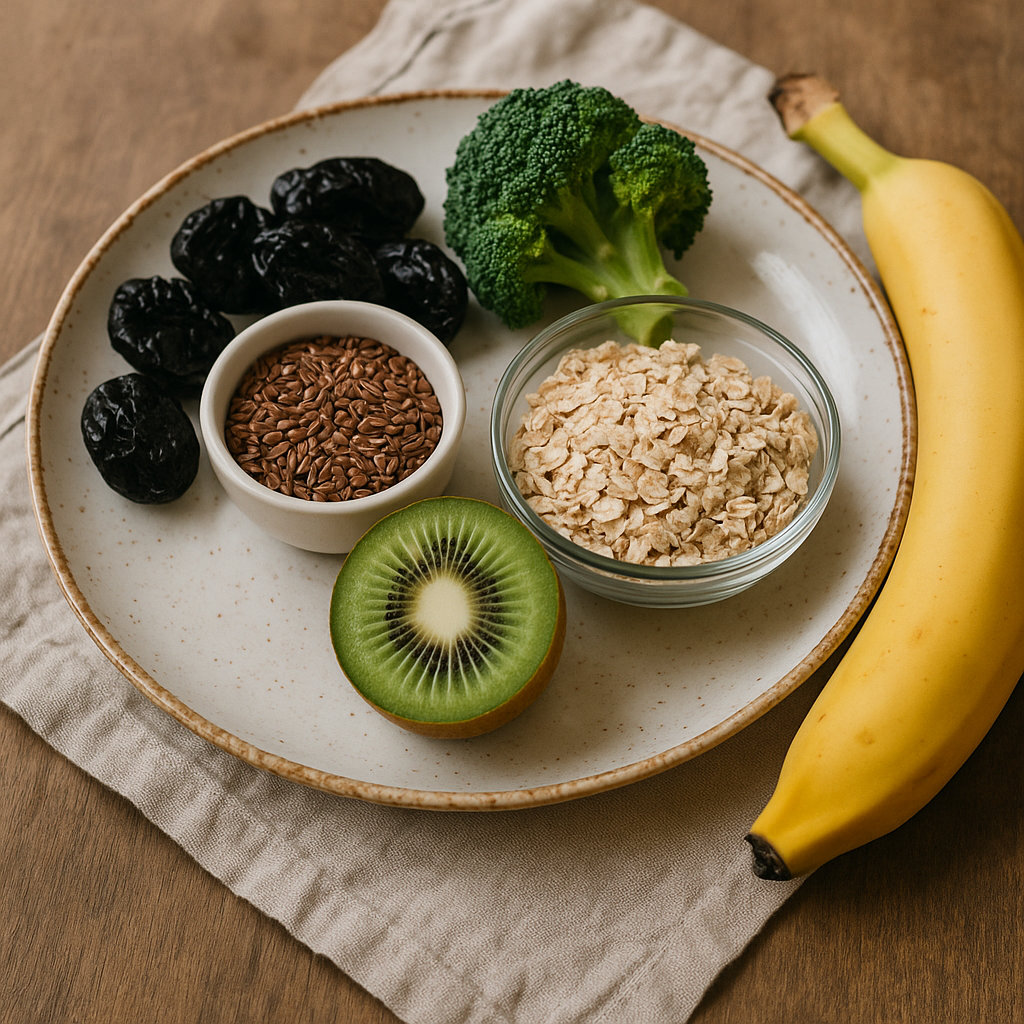What Causes Constipation: Ayurvedic Reasons, Symptoms, and Treatment

Let’s get one thing straight from the start — constipation isn’t just about not pooping for a day or two. It’s this weird, creeping discomfort that can mess with your entire mood and body. And if you’ve ever had to Google what causes constipation at 2 a.m. while curled up on the bathroom floor, you know it’s not something you can brush off with a glass of water and wishful thinking.
Now, if we’re being honest, constipation is way more common than we like to admit. People don’t talk about it, but they’re definitely thinking about it. Maybe it’s the bloating, the sluggishness, or just feeling... stuck. So, yeah — it matters. This article explores what causes constipation, dives deep into constipation symptoms, flags constipation danger signs, and even wanders into the ancient wisdom of Ayurveda to explore natural, time-tested solutions. Buckle up — things might get a little personal.
What Is Constipation According to Ayurveda
Alright, so picture this: in Ayurveda, your gut isn't just a food-processing machine. It’s your second brain, a spiritual barometer, and an energetic hub all rolled into one. When digestion gets sluggish, it’s not just a dietary issue — it’s a full-body, full-being thing.
Ayurveda identifies constipation primarily as a Vata imbalance. That’s the dosha (think: energetic force) associated with air and space. Vata governs movement — breath, nerve impulses, elimination. When it’s out of whack, everything slows down or dries up. Hence, chronic constipation causes aren’t just external. They might be deeply tied to your constitution, routines, and emotional patterns.
So constipation, in this lens, is more than stool sitting in your colon. It’s energy that’s not moving. Fascinating, right?

Don't wait or self medicate. Start chat with Doctor NOW
What Causes Constipation and Digestive Slowness
Let’s take off the mystic robe for a second and look at what causes constipation from a more day-to-day perspective. Because sometimes, it's not ancient karma. It’s just... too many bagels.
Dehydration, Stress, and Lifestyle Habits
Honestly, most of us are walking around dehydrated and wired. We guzzle coffee, skip meals, sit too long, doom-scroll through bad news, and forget to drink actual water. No surprise — this combo tightens the gut like a clenched fist. And that’s before we get to stress.
Stress is sneaky. It pulls blood away from your digestive organs and parks it in your muscles (hello, fight-or-flight). Over time, this can grind digestion to a halt. You might be surprised how often what causes severe constipation is simply the chaos of everyday life — not some exotic disease.
Chronic Constipation Causes and Energetic Triggers
Now let’s loop back to energy. In Ayurveda, chronic constipation causes include eating on the go, skipping meals, ignoring the urge to go (guilty), or suppressing emotions. It’s all about disrupting the flow. You might notice this weird pattern — when you’re anxious or traveling, boom: constipated. Coincidence? Not really.
Even cold weather or too much dry, crunchy food (hello, granola) can make things worse. It’s like your system forgets how to let go. And sometimes, you don’t even realize how bad it is until things get... really backed up.

Foods That Cause Constipation
Let’s talk food. Because — let’s be real — even the most enlightened digestive system can’t handle everything. Sometimes, what’s on your plate is literally what’s keeping you from the toilet.
Heavy, Dry, or Cold Foods That Aggravate Vata
In Ayurveda, the Vata dosha — again, the airy, spacey one — gets totally wrecked by foods that are dry, cold, light, or hard to digest. Think crackers, cold salads, popcorn (yes, even the organic kind), and that cold smoothie you swore was “clean eating.”
Vata needs warmth, oil, and moisture to function well. When your diet is full of cold sandwiches, raw veggies, or “just coffee” for breakfast, things start to back up. Constipation causes like these aren’t obvious at first. But give it a week, and your gut starts whispering: Hey, maybe warm soup would’ve been smarter.
Ayurveda’s take? If it doesn’t feel nourishing — deeply nourishing — it’s probably going to slow you down.
Common Constipating Foods and How to Balance Their Effects
Now here’s the tricky part: some classic constipating foods are also considered “healthy” by modern standards. Bananas, for instance. Especially the underripe ones. Cheese is another big one. Red meat, too. They’re not evil, but they need balance.
Let’s say you love toast and eggs in the morning. That’s fine! But balance it with a warm tea or a spoon of ghee. Add some stewed prunes or figs if you can. It’s all about counterbalancing dryness and heaviness with moisture, oil, and warmth. Ayurveda isn’t about cutting everything out — it’s about harmony.

Constipation Symptoms
You’d think symptoms of constipation would be obvious. But people get weirdly disconnected from their bodies — they go days without noticing the signals. Until it hurts.
Early Signs and Patterns of Constipation
So what should you actually watch for?
The big one, obviously, is not pooping. But it’s more nuanced than that. Are you going fewer than three times a week? Is it dry, hard, or painful? Do you feel like you’re not fully emptying? That lingering unfinished sensation? Yep, that’s a sign.
Other weird ones: gas that doesn’t pass, bad breath, skin flare-ups, even a foggy mind. No kidding — Ayurveda says that toxins (ama) from poor digestion can sneak into the bloodstream. It’s not just a gut issue. It’s a you issue.
You might start noticing cycles too — like always getting constipated before a stressful event, after travel, or during your period. That’s not random. That’s your body giving you a heads-up.
Constipation Danger Signs Requiring Medical Attention
Okay, now for the serious part — the constipation danger signs.
If you haven’t gone in over a week and you feel pain, bloating, or nausea, don’t just Google it. Talk to someone. If your stool is pencil-thin, dark like tar, or streaked with blood, that’s another major red flag. So is sudden weight loss without trying, or vomiting from “backed-up” digestion.
These aren’t just severe constipation symptoms — they could point to something much more serious, like bowel obstruction or even cancer. No, that’s not to scare you. It’s to say: listen early, act sooner.

Ayurvedic Constipation Relief and Home Remedies
When it comes to treating constipation, Ayurveda doesn’t reach for the laxatives first. Instead, it whispers: “Let’s bring your body back into rhythm.” It’s not just about making you poop today — it’s about keeping everything moving tomorrow, and the next day, and the day after that.
Herbal Teas, Oils, and Gentle Cleansing Practices
Let’s start gentle. Triphala is the rockstar here — a combination of three fruits that’s famous for detoxifying without depleting. Take it at night with warm water. If your system is super dry, a teaspoon of ghee or castor oil before bed can do wonders too. Strange, yes. But strangely effective.
Herbal teas with ginger, fennel, or licorice root are also amazing. They soothe Vata, reduce gas, and promote natural elimination. And no, you don’t need to turn into an herbalist overnight. Just start with one thing and see how your body responds.
Abhyanga, the Ayurvedic self-oil massage, is another surprising helper. Warm oil on your belly — clockwise motion — helps relax the nervous system and stimulate peristalsis. It's low-effort, high-reward.
Daily Routine and Movement to Stimulate Elimination
Okay, let’s be honest: a lot of chronic constipation causes are lifestyle-related. Like skipping meals, waking up late, or forgetting to move your body in the morning.
Ayurveda is big on rhythm. Wake up at the same time daily (preferably before sunrise). Drink a glass of warm water first thing — with lemon or not, up to you. Sit quietly, even if the urge isn’t strong. Over time, your body will learn.
Movement matters too. Not gym workouts necessarily — just walking, light yoga, even gentle twists. If you’re always sitting, you’re basically telling your colon to fall asleep. And yeah, it listens.

When to Seek Medical Help for Lower Belly Pain
Here’s the thing — not every belly pain is just constipation. If you feel sharp pain in your lower abdomen, especially if it comes and goes in waves, don’t mess around.
For women, it could be linked to ovulation, hormonal shifts, or even endometriosis. For anyone, it might be a sign of a bowel obstruction, appendicitis, or other serious issues. If over-the-counter stuff isn’t working, if you’re running a fever, or if your gut just feels “off” in a way that’s hard to explain — listen to that.
Your intuition matters. So does your doctor.
Conclusion
So yeah, what causes constipation isn’t a one-size-fits-all answer. It could be your food, your stress, your dosha, or your daily habits. It could be something deeper, or it could be something simple like not drinking enough warm fluids.
But here’s the cool part — once you start noticing the patterns, you can actually do something about it. You can shift your routine, add warm oils, tweak your meals, or just stop ignoring your body’s signals.
If your gut’s been quiet lately — or way too noisy — maybe take that as a sign. Tune in. Start small. And if you’re really stuck, talk to a pro.
FAQs
When should I worry about lower stomach pain?
If the pain is sharp, persistent, comes with fever, vomiting, blood in stool, or you haven’t passed a bowel movement in over a week — don’t wait. Call your healthcare provider.
Can lower abdominal pain in females be linked to emotional imbalance or stress?
Absolutely. Ayurveda especially sees the gut as deeply tied to emotions. Anxiety, sadness, or chronic stress can all tighten the belly and mess with elimination.
What is a lower stomach pain that comes and goes in waves?
That could signal intestinal cramping, gas buildup, or even a blockage — especially if it’s rhythmic. It might also indicate something like IBS. Either way, it's worth checking out if it keeps happening.
Got any more questions?
Ask Ayurvedic doctor a question and get a consultation online on the problem of your concern in a free or paid mode.
More than 2,000 experienced doctors work and wait for your questions on our site and help users to solve their health problems every day.

